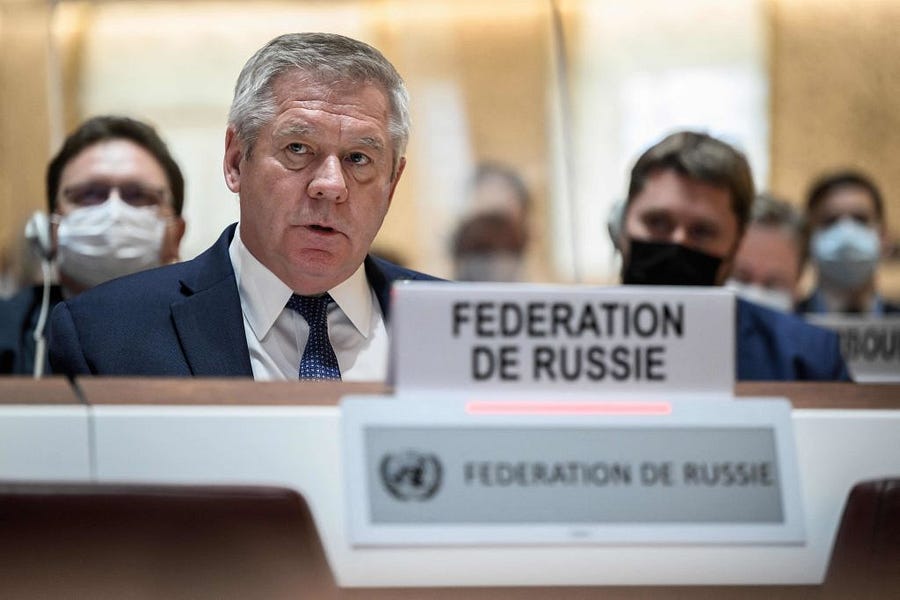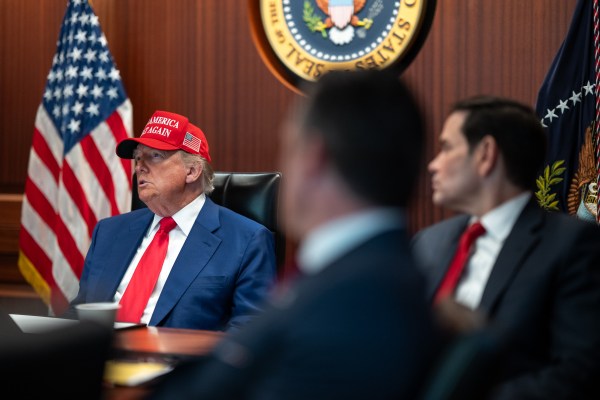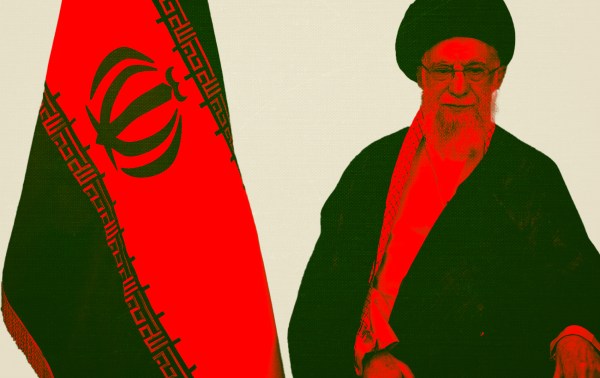Members of the U.N. Security Council sat around a table in New York last week, pleading with Moscow to call off its assault on Ukraine. Ambassador after ambassador took turns vowing Russia would be isolated on the world stage for such a blatant violation of international law. Some even warned the U.N. would suffer the fate of its failed predecessor, the League of Nations. One hour into debate, Vladimir Putin announced a full-scale invasion.
The meeting was surreal, and not just because the entire proceeding was chaired by Russia, which held the Security Council’s rotating presidency in February. The imbroglio exposed as hollow the mistaken belief—far too common in Western nations, including here in the United States—that public shaming in multilateral organizations can deter ruthless dictators bent on war. Indeed, Putin announced the beginning of Russia’s invasion just as the U.S. ambassador to the U.N., Linda Thomas-Greenfield, delivered her speech urging Russia to de-escalate. Moments later, Russian missiles began raining down on Kyiv and other Ukrainian cities.
Of course, this is hardly the first time Russia has made a mockery of an institution established to defend international peace and security. Russia also routinely wields its Security Council veto to shield itself and other rogue regimes from international accountability, for example by blocking U.N. sanctions against Syria’s Assad regime for its use of chemical weapons against its own people.
Indeed, last week’s meeting was just the latest reminder of how Russia, China, and other U.S. adversaries flout international law while simultaneously manipulating international organizations to serve their narrow ends. Unfortunately, despite having proclaimed engagement at the U.N. to be an important plank of its foreign policy agenda, the Biden administration’s international-organizations strategy is broken.
“Diplomacy is back at the center of our foreign policy,” President Biden declared shortly after taking office. Yet when it comes to the U.N. system, U.S. diplomacy needs to do a better job of defending American interests and values.
The U.N. Human Rights Council is case in point. In 2019, Secretary-General António Guterres appointed a former Russian government official to be the director-general of the U.N. office in Geneva. That mission is also home to the Human Rights Council — a deeply flawed body to which Russia was elected in 2020 despite an abysmal human rights record that has only worsened since.
This irony may soon become even grimmer. A recent U.S. letter to the U.N. high commissioner for human rights, whose office serves as the UNHRC’s secretariat, warned that Russian forces “are creating lists of identified Ukrainians to be killed or sent to camps following a military occupation.” The Russians also “will likely use lethal measures to disperse peaceful protests or otherwise counter peaceful exercises of perceived resistance from civilian populations,” the letter said. The International Criminal Court’s top prosecutor says there’s already “a reasonable basis to believe that both alleged war crimes and crimes against humanity have been committed in Ukraine.”
Nevertheless, when Kyiv requested an emergency UNHRC debate on February 24, the council didn’t hold the meeting until March 3, in order to “be as non-disruptive as possible to [its] programme of work.” As human rights activist Hillel Neuer noted, the council has previously convened emergency debates on the same day—when the crisis in question involved criticizing Israel.
Yet instead of recognizing the UNHRC is broken, Biden rejoined the council earlier this year, pledging to reform it from within. Last month, a State Department spokesperson declared that the council “plays a crucial role in promoting respect for human rights as well as fundamental freedoms around the world.”
Although Ambassador Thomas-Greenfield has called for Russia to be isolated at the United Nations, the Biden administration last week issued a list of exemptions to Russia’s supposed diplomatic isolation. At the top of the list: U.S. diplomats are authorized to keep working with Russia at the U.N., other international organizations and in multilateral settings like the Iran nuclear talks.
The UNHRC isn’t the only organization where Moscow enjoys influence. For example, Russia serves on the executive board of the United Nations Educational, Scientific and Cultural Organization, which Biden wants to rejoin this year and subsidize with a taxpayer check for $500 million. Moscow also sits on the decision-making council of the International Civil Aviation Organization, while a former Russian nuclear utility official serves as deputy director general and head of the department of nuclear energy at the International Atomic Energy Agency. A longtime Russian diplomat currently serves as U.N. under-secretary-general for counterterrorism. These posts add to Russia’s international prestige and, in some cases, give its officials access to sensitive information.
Russia, meanwhile, is running Rashid Ismailov, a former Russian government official and executive at China’s Huawei, to become the next director general of the International Telecommunication Union, a key standard-setting body for the internet, 5G, and other digital technologies. If he wins, Ismailov would be well-positioned to support Moscow’s longstanding efforts to reduce U.S. influence in internet governance and shape international norms pertaining to cybersecurity.
As Russian forces march deeper into Ukraine, now is the time for Washington to fix its international-organizations strategy.
The U.S. and its allies need a comprehensive, coordinated strategy to advance the interests of free nations within these organizations while countering the corrosive influence of Russia and China. U.S. leadership will be critical, as many other countries will be reluctant to confront Moscow and Beijing. Indeed, while the U.N. General Assembly passed a resolution this week deploring Russian “aggression against Ukraine,” it amounted to little more than a strongly worded letter, recommending no consequences for Russia’s actions.
Congress, meanwhile, must better calculate the costs and benefits of providing billions of dollars to agencies manipulated by U.S. adversaries—and wield its power of the purse accordingly. And the Biden administration must finally recognize what engagement at the U.N. can and cannot do.
An international system that Putin and other dictators can flout or corrupt with impunity is doomed to fail. So is an American international-organizations strategy that mistakes “engagement” for results and relies on corrupted institutions to defend itself and its democratic allies. That reality was laid bare the minute Russia invaded Ukraine.
Richard Goldberg, a former National Security Council official, is a senior adviser at the Foundation for Defense of Democracies, where John Hardie is research manager and analyst.






Please note that we at The Dispatch hold ourselves, our work, and our commenters to a higher standard than other places on the internet. We welcome comments that foster genuine debate or discussion—including comments critical of us or our work—but responses that include ad hominem attacks on fellow Dispatch members or are intended to stoke fear and anger may be moderated.
With your membership, you only have the ability to comment on The Morning Dispatch articles. Consider upgrading to join the conversation everywhere.